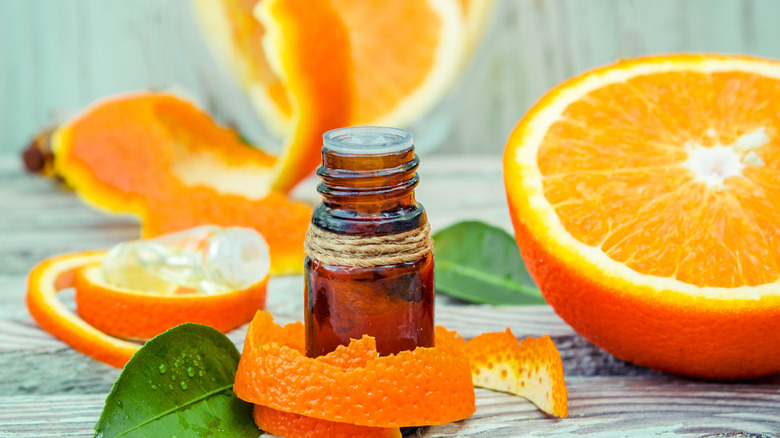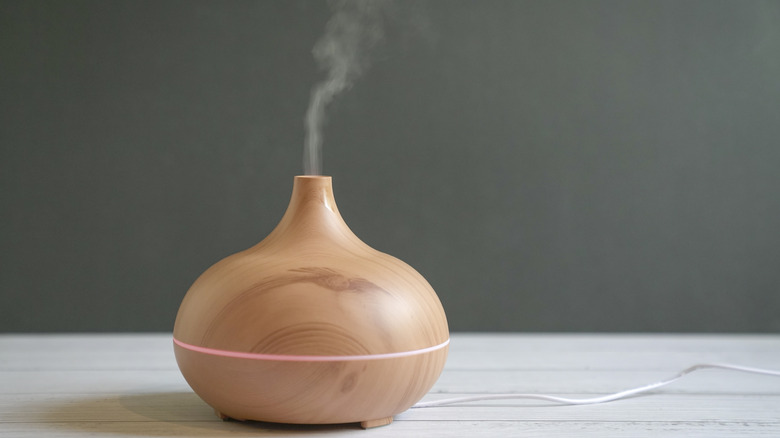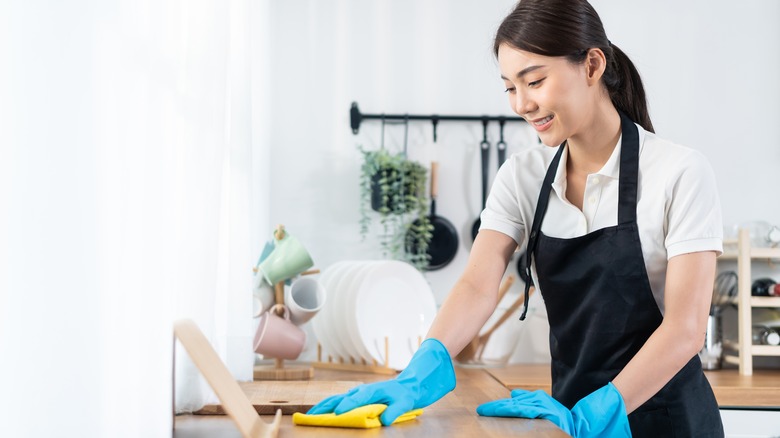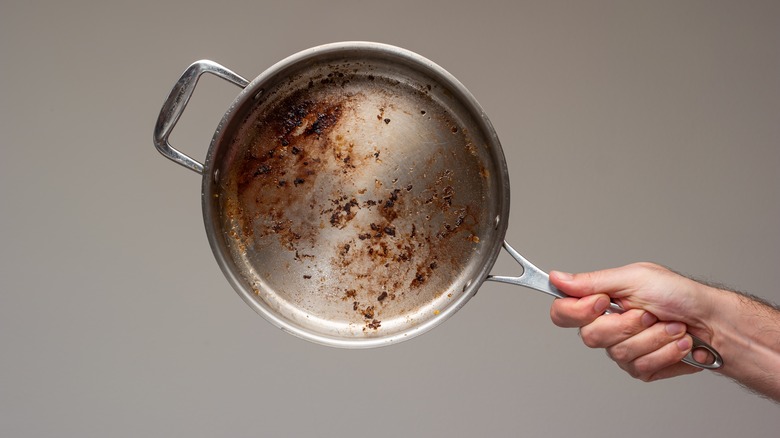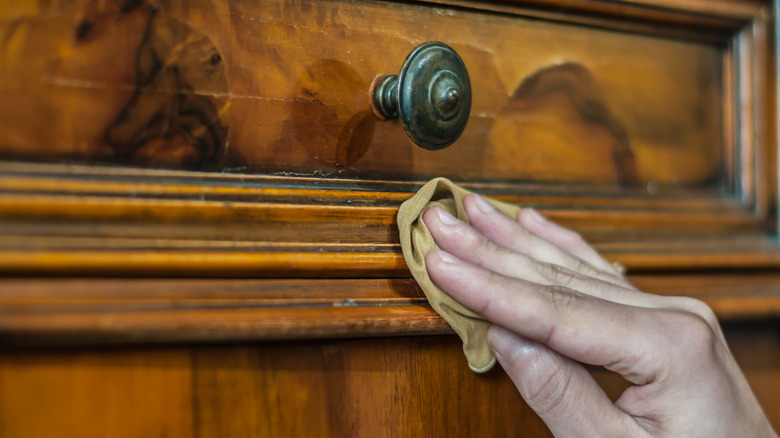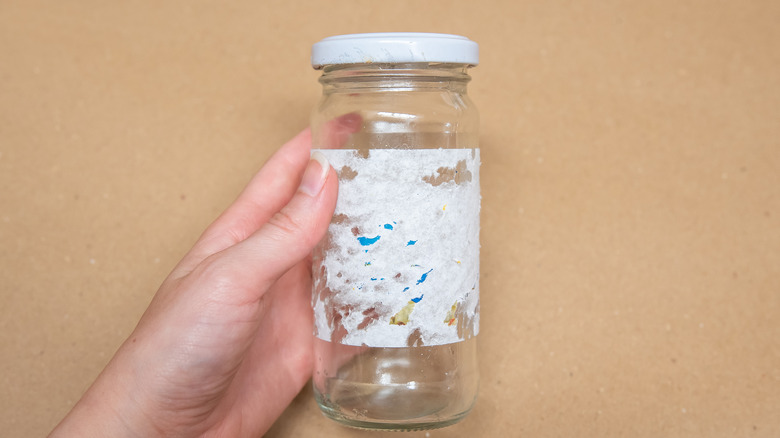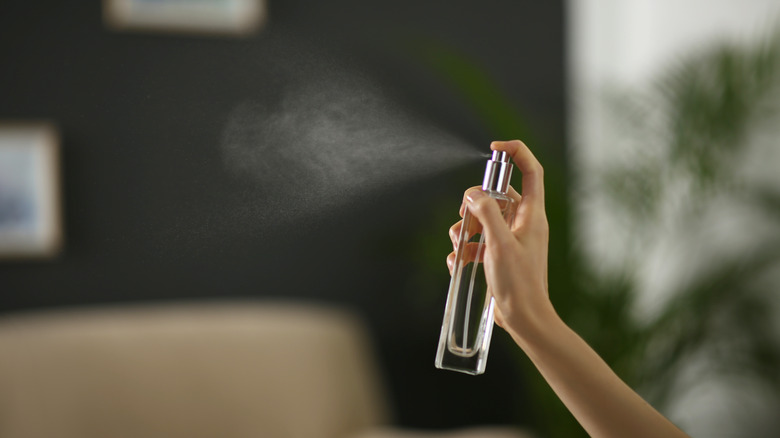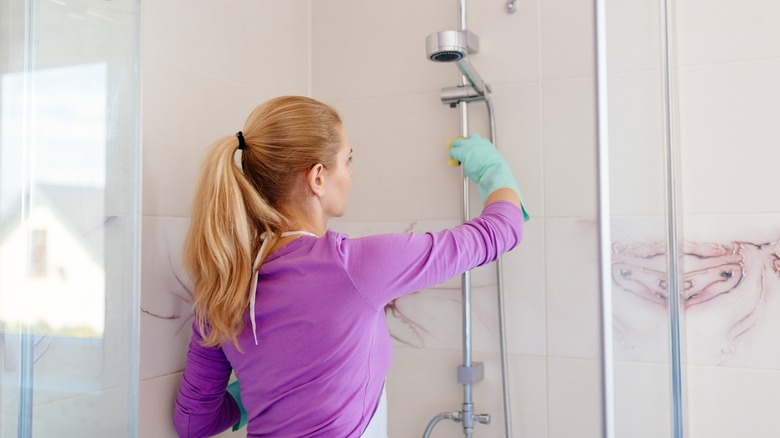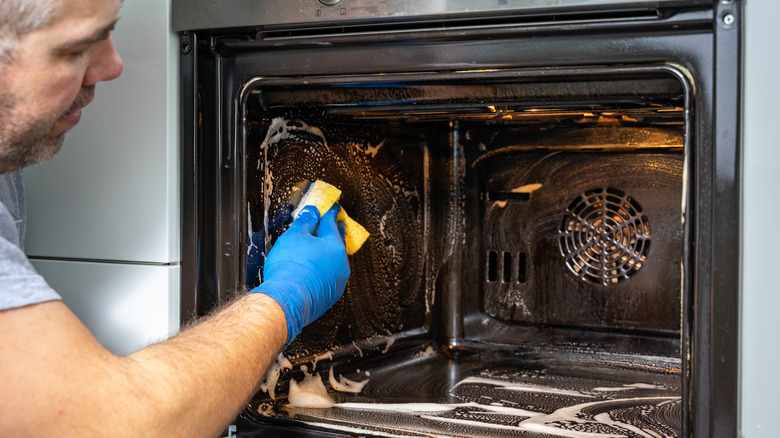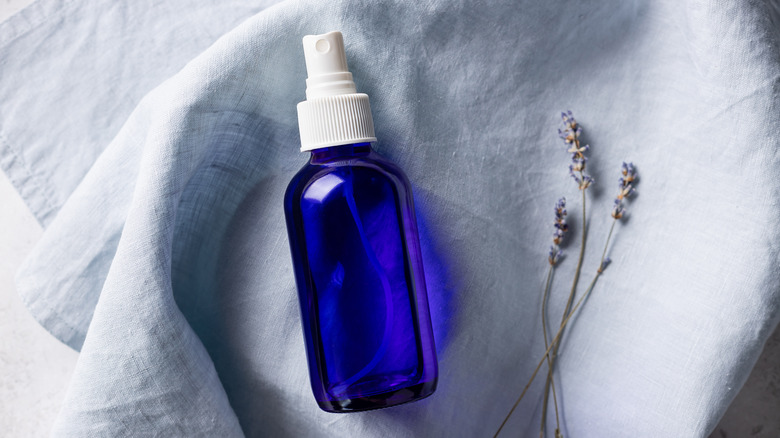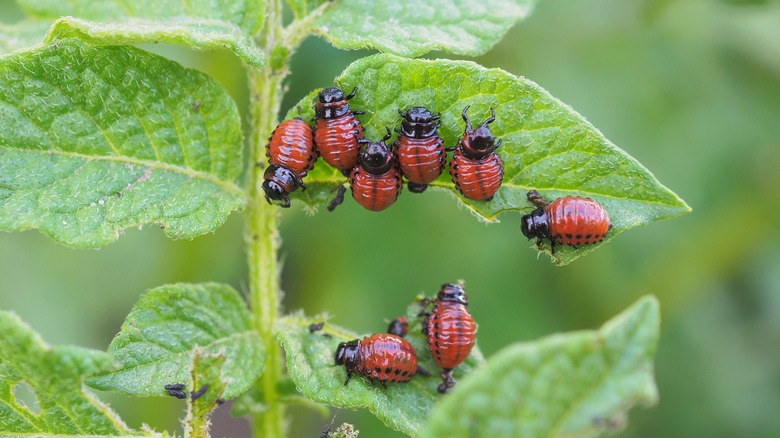Ways You Can Be Using Orange Essential Oil In Your Home
Orange essential oil has a very crisp and invigorating scent. If you love essential oils and citrus fruits, this may be one of your favorite scents. Cliganic shares that there are several benefits associated with adding orange essential oil to your collection. Its sweet, pleasant scent can actually improve your mood and increase feelings of joy and positivity. Moreover, this oil can help boost energy levels, encouraging you to be more active and healthy.
If you've been an essential oil user for several years, you may already know that oils are for much more than adding fragrance to a space. As One Good Thing notes, there are many different ways you can use essential oils — from cleaning and deodorizing your clothing to infusing a natural scent into your home. Read on to learn more about the top ways to use orange essential oil so you can truly benefit from all it has to offer.
Diffusing it
If you're familiar with essential oils and have used them before, then you could probably guess this first use for orange oil. Adding a few drops into a diffuser can help spread its wondrous scent through your home, allowing you to benefit from all the mood-improving properties. According to Saje, ultrasonic diffusers are the best choice to use when diffusing your favorite essential oils. These work without any heat and uses a cool mist to get the essential oils out into the space. The way this happens is through a small ceramic disc on the diffuser's interior. When the unit is powered on, the disc vibrates. Its vibrations cause ultrasonic waves to form. These waves, in turn, slowly break off tiny pieces of the oil, turning them into a mist that can move around your room.
These diffusers come in a wide variety of options, meaning there's an option for any type of decor. There are sleek and modern designs and ones that emulate a cozy wood-grained pattern. You can find kid-friendly styles so they can benefit from the scent in bedrooms and playrooms, and ones powered by USB ports, perfect for creating an uplifting home office. These versatile options allow you to infuse the bright and citrusy scent, all throughout your home.
Antibacterial kitchen cleanser
Believe it or not, that orange essential oil that uplifts your mood can also be used as a kitchen cleaner. According to a study published on PubMed, researchers concluded that orange essential oil was one of the most effective at killing salmonella. This makes it perfect for tackling surfaces like kitchen counters.
Diffuser World shares a recipe that combines orange essential oil with melaleuca essential oil, vinegar, distilled water, and liquid dish soap. Once mixed, the solution can be used to clean counters, tables, and several other surfaces in the kitchen. Vinegar is one of the other key ingredients in this natural cleaning product, and it's environmentally friendly, breaks down many stains and films, and leaves surfaces clean. Keep in mind, you won't want to use this vinegar and orange essential oil cleaner on natural stone, aluminum, or cast iron surfaces as its acidity could damage them. Not only will this kitchen cleaner add a natural scent but you can feel confident in your decision to use a non-toxic cleaning product. Plus, it's a great option for allergy and asthma sufferers whose symptoms can be aggravated by chemical cleaners. It also reduces the waste that comes from typical cleaning product containers and is a budget-friendly solution you can enjoy using.
Degreasing or cleaning burnt pots and pans
In addition to helping you keep surfaces in the kitchen free of grime and bacteria, orange essential oil can also be helpful when trying to clean your pots and pans. DIY Natural explains that limonene is a component of orange essential oil. It is a solvent, so when applied to stuck-on grime and burnt-on messes, the limonene can break it down and release it from the pan. If you have cookware or baking sheets that look like they've seen better days, try rubbing some orange essential oil over the mess, and let it sit for about 15 minutes. Then, use a rag or sponge to scrub the surface and remove the gunk.
Recipes with Essential Oils explains how you can make an even more effective degreaser using orange oil, baking soda, and hydrogen peroxide. Mixing the ingredients together will create a paste, which you can apply over any dirty areas. After letting the mixture sit for a few mixtures, use a dish rag to really work the cleanser into the surface and release the baked-on messes.
Polishing wood furniture
If you've noticed that your wood furniture is looking a little dull or dingy, you can actually use orange essential oil to help revitalize it and restore its finish. First, unlike some other cleaning products that can damage wood surfaces, orange essential oil is a much gentler cleaner. Green Gobbler shares that the oil can also help polish the surface and restore the piece's original shine. Once you've cleaned and polished the furniture with the oil, it will leave a little residue behind. This residue is actually a good thing, as it will offer some protection against future wear and damage. Plus, by cleaning your wood furniture with the oil, you'll be spreading more of the fragrant scent throughout your home, so it really is a win-win.
To clean wood furniture with orange essential oil, you can use a microfiber cloth. Mix up your own spray with olive oil, vegetable glycerin, vinegar, and orange oil (via One Essential Community). Spray a small amount of cleaner on the cloth and use it to gently rub each piece of wood furniture. As with other products, it is always a good idea to test the oil in an inconspicuous spot before cleaning an entire item. This can help ensure that it doesn't cause any damage to the wood's finish.
Removing sticker residue
Stickers, price tags, and other labels are known to leave behind a sticky residue. Removing this residue can be very difficult and time-consuming. Clutter Healing shares that orange oil can help do the trick. If you add a few drops of the oil over the affected area and let it sit for about a minute, you should find that the gunk comes off with minimal effort. Just use an old credit card and a damp cloth to release the loosened glue from the surface.
If you didn't realize orange essential oil could help you with this task, you may decide to reach for Goo Gone instead. While Goo Gone can also help get rid of sticker residue, The Filtery explains why some of the ingredients used to make this popular cleaner make it a potentially dangerous product. For example, one of the key components of Goo Gone is petroleum distillates, which have been linked to cancer, respiratory issues, and genetic defects. When you consider that a natural ingredient, like orange essential oil, can remove stubborn gunk as Goo Gone does, the right answer about which to use should be clear.
Fragrant air freshener
If you love the scent of orange essential oil, why not use it to make your own invigorating and uplifting air freshener? The Lavender Homefront explains that this is not only a cost-effective way to improve the way your home smells, but it can also help you keep your home healthier. Store-bought air fresheners can be formulated with potentially dangerous chemicals. When you make your own fragrance spray, you remain in complete control over what you introduce into your home. Citrusy essential oils are ideal choices to enhance your space. Not only do they have a refreshing scent, but they can help mask some less pleasant odors.
To make your own orange oil air freshener, you'll only need a few supplies. First, you'll want to make sure that you have a glass spray bottle cleaned and ready to house your solution. Next, you'll create your own custom blend using orange oil and other fruity choices like lime and lemon oils. You'll want to use about 30 drops total of essential oils to about 2 tablespoons of rubbing alcohol. Gently shake, tighten the lid, and mist your space for an instant scent refresh.
Bathroom cleaner
Just as your beloved orange essential oil can help with kitchen cleaning tasks, you can also use it to help keep your bathrooms clean. Natural Living Family explains that making a DIY essential oil bathroom cleaner is a healthier alternative to store-bought ones. One tried and true oil combination for cleaning bathrooms is citrus oils like orange combined with and tea tree oil. Tea tree oil has a strong scent and offers antibacterial and antifungal properties, making it an ideal addition to any bathroom cleaner. In addition to the essential oils, you'll also need castile soap, baking soda, and distilled water to make this solution.
Rocky Mountain Oils shares an additional recipe featuring orange essential oil. Their after-shower spray recipe combines grapefruit seed extract, water, and white vinegar with the oil. This is a perfect low-fuss way to keep tile surfaces and shower doors free of soap scum. A similar recipe from Luce mixes bitter orange essential oil with lemon juice and Borax powder. This is a great scouring cleaner that can help remove stubborn grime from bathtubs and shower walls.
Oven cleaner
Cleaning the oven is a chore that no one enjoys. Beyond the frustration of trying to remove all the baked- and burnt-on messes inside the oven, there is one other big downside of this task. Oven-cleaning products can pose a major health risk. Ovenu explains that toxic ingredients are found in several oven cleaners. One of the ingredients commonly used is sodium hydroxide, or caustic soda, which can burn the skin, irritate the eyes, and cause damage to the lungs if it is not used properly. Moreover, it isn't all that great for your oven itself. Caustic soda may also cause the glass on the oven to dull, corrode some of its components, remove the non-stick coating inside the oven, or cause any rubber components to rot.
Anita's Housekeeping Referral Agency explains that making your own oven cleaner can offer a safer alternative without sacrificing effectiveness. Their DIY cleaner harnesses the power of baking soda and vinegar to get rid of burnt food residues and lingering odors. Adding orange essential oil to this mixture can further enhance its cleaning capabilities. Because the oil is a natural degreaser, it can work with the baking soda in the recipe to ensure that all the gunk and messes are effectively removed from the oven.
Linen spray
Linen sprays aren't necessary, but they are a simple way to add a luxurious touch and award yourself a more relaxing night's sleep. The Homespun Hydrangea shares a recipe featuring sweet orange, chamomile, and lavender essential oils diluted with witch hazel. They note that combining these three oils together creates a pleasant fragrance that may help provide deeper sleep, decreased tension, and an improved mood.
Sunday Citizen explains that in addition to freshening your bedding, linen sprays offer a variety of other uses. You can spritz them on clothes that you're ironing to give them an uplifting and enjoyable fragrance, extend the time between washes by refreshing already-worn clothing items, or even spray them around in a hotel room to make yourself feel more at home. Parachute shares a few additional ways to use linen spray, including hiding odors in carpets or area rugs and getting rid of musty smells in throw pillows.
Repelling pests
Dave Owens the Organic Garden Guy highlights the reasons why orange oil can be such an effective pest repellent. Insects are killed by the D-limonene in the orange oil. This makes it a safe and effective way to get rid of bugs both inside and outside the home. Plus, it works to eliminate a variety of insects including ants and flies, two common household pests. Just take care when using this oil as it can also kill pollinators like bees and butterflies.
If you'd like to try to make your own pest repellent, 21 Oak shares that you can combine orange, tea tree, cedarwood, and eucalyptus essential oils together, using about 15 drops total in a spray bottle. Add 4 ounces of water and shake the mixture to combine it. Then, apply it regularly near plants, floorboards, or any other areas where you're dealing with a bug problem.
